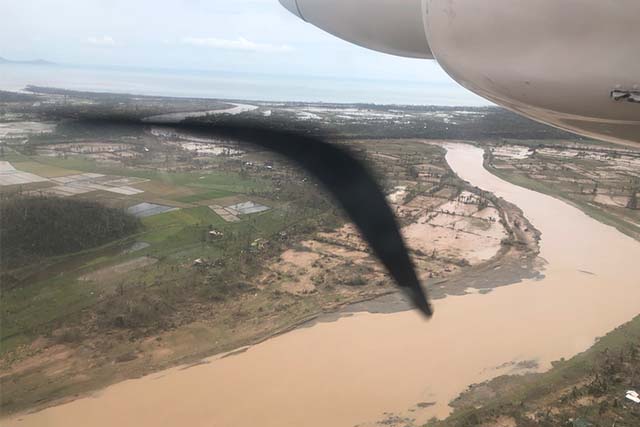The delay in relief operations and perceived lack of media coverage in Catanduanes, where Super Typhoon Rolly first made landfall, prompted concerned Filipinos to ask for the actual situation in the province.
“Rolly” (international name Typhoon Goni), said to be the strongest typhoon in 2020 with sustained winds of 135 miles per hour at its center and gusts of 165 miles per hour, entered the municipality of Bato in Catanduanes at 4:50 a.m. last Sunday, on November 1.
Telecommunication in the province immediately went out after.
US-based meteorologist Dakota Smith shared a terrifying gif on the tropical cyclone’s entry to the island.
“Super Typhoon Goni’s devastating landfall in Catanduanes. A heartbreaking moment for the Philippines,” Smith wrote.
Following the onslaught, as of November 2, PAG-ASA reported that the typhoon finally weakened and is expected to exit the Philippine Area of Responsibility tomorrow morning.
The problem with Catanduanes
Of the severely battered provinces, disaster officials admitted that Catanduanes was the hardest to reach because of the loss of telecommunication and impassable roads.
National Disaster Risk Reduction and Management Council (NDRRMC) spokesperson Mark Timbal said that because cell towers in Bato got toppled, the agency only managed to communicate with Catanduanes officials through radio and satellite phones.
Timbal also stated that the Philippine Red Cross reported that roads in the municipality of Virac in Catanduanes was not passable because of debris and floods. The town’s power supply was also cut off.
“Our local communications are limited. The storm was at its height when it hit the Bato-Catanduanes area,” he told CNN Philippines on Monday.
In another interview on November 2, Timbal lamented that disaster officials continued to have communication problems with the people from the remote island.
He also advised Filipinos to be cautious on sharing alleged photos about Catanduanes, citing still no internet access and telecommunication there.
“Our countrymen should be reminded that we’re having communication problems in Catanduanes, and if these photos circulate on social media, then it’s quite impossible for these photos to have been sent from that particular area, given that mobile telecommunication is down. Even internet cannot be accessed,” he said.
Timbal stressed that it’s difficult for any person within the province to get a picture and share it on social media.
‘Land of the Howling Winds’
Located off the coast of the Bicol region, Catanduanes has often been the first to bear the brunt of strong typhoons, hence being dubbed as the “Land of the Howling Winds.”
However, concerned Filipinos and residents expressed being fed up with the resilient narrative painted about the island’s residents, triggering the hashtag #NasaanAngCatanduanes that dominated Facebook, Twitter and even Reddit.
Under this hashtag, some Filipinos sought for photos and videos on the situation there. Those who live in Catanduanes decried that their home is not just a “wall” against natural calamities.
Facebook user Shilley Sta. Rosa stressed via a long viral post last Sunday that Catandanganons are not resilient, rather helpless.
“We have not been resilient. We were just helpless. It was a process of learning how to be independent because we only had ourselves to rely on. There was almost no real-time media coverage of the damages but there were always stories of resilience. This gap in narrative gives the impression that Catanduanes can easily recover from any typhoon,” Sta. Rosa said.
She then encouraged other residents to share their stories of trauma and damages online.
Twitter user @ethanbob01 also noted that they have no contact outside more than 12 hours after the storm passed.
“No media coverage. No photos. No plans for help. Please see us. Please notice us. We are the island who welcomed the strongest typhoon of 2020,” the user wrote.
In the morning of November 2, some mainstream media managed to report photos on the conditions at the municipalities of Viga, Gigmoto and Pandan.
The Philippine Coast Guard also released photos and videos of their aerial surveillance over Catanduanes.
Left Manila before dawn today. Just arrived CamSur and these were the first signs of devastation we saw.
Will be going around Albay and Catanduanes as well. pic.twitter.com/VyapC88s9l
— Leni Robredo (@lenirobredo) November 2, 2020
On other hand, President Rodrigo Duterte, whose absence during the onslaught of Rolly is being questioned under the hashtag #NasaanAngPangulo, will reportedly visit another super typhoon-hit area Albay, Legazpi today.
RELATED: Throwback to Duterte’s ‘Yolanda’ efforts amid absence during ‘Rolly’

